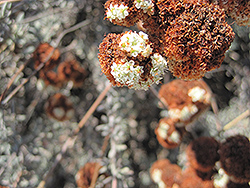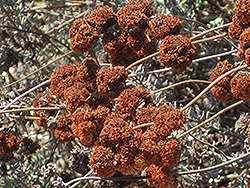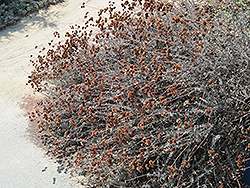Fri & Sat 8am - 8pm
Sun 8am - 7pm
Anytown, USA 12345
fax: 261.787.0463
e-mail: info@successgc.com


Plant Finder

Eastern Mojave Buckwheat
Eriogonum fasciculatum var. foliolosum
Height: 4 feet
Spread: 5 feet
Sunlight:
![]()
![]()
Hardiness Zone: 7b
Other Names: Leafy California Buckwheat, Wild Buckwheat
Description:
A tough, attractive plant for use in low maintenance landscaping or xeriscaping; a native shrub, producing white flower clusters in spring that turn pink, then rust colored in summer and fall, persisting for a long time; excellent for naturalizing
Ornamental Features
Eastern Mojave Buckwheat features showy clusters of white flowers with shell pink overtones rising above the foliage from late spring to late fall, which emerge from distinctive scarlet flower buds. The flowers are excellent for cutting. It has green deciduous foliage. The tiny narrow leaves do not develop any appreciable fall color. The twisted dark gray bark and brick red branches add an interesting dimension to the landscape.
Landscape Attributes
Eastern Mojave Buckwheat is a dense multi-stemmed deciduous shrub with a mounded form. Its relatively fine texture sets it apart from other landscape plants with less refined foliage.
This is a relatively low maintenance shrub, and should only be pruned after flowering to avoid removing any of the current season's flowers. It is a good choice for attracting birds, bees and butterflies to your yard. Gardeners should be aware of the following characteristic(s) that may warrant special consideration;
- Self-Seeding
Eastern Mojave Buckwheat is recommended for the following landscape applications;
- Mass Planting
- Rock/Alpine Gardens
- Border Edging
- General Garden Use
- Groundcover
- Naturalizing And Woodland Gardens
Planting & Growing
Eastern Mojave Buckwheat will grow to be about 4 feet tall at maturity, with a spread of 5 feet. It tends to fill out right to the ground and therefore doesn't necessarily require facer plants in front. It grows at a slow rate, and under ideal conditions can be expected to live for approximately 20 years. As this plant tends to go dormant in summer, it is best interplanted with late-season bloomers to hide the dying foliage.
This shrub does best in full sun to partial shade. It prefers dry to average moisture levels with very well-drained soil, and will often die in standing water. It is considered to be drought-tolerant, and thus makes an ideal choice for xeriscaping or the moisture-conserving landscape. It is not particular as to soil pH, but grows best in poor soils, and is able to handle environmental salt. It is highly tolerant of urban pollution and will even thrive in inner city environments. This species is native to parts of North America..


